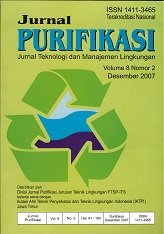PENGARUH PENGGUNAAN BAHAN BAKAR BIOETANOL TERHADAP EMISI GAS BUANG KENDARAAN BERMOTOR MESIN BENSIN (OTTO) PADA SIKLUS URBAN (UC) DAN EKSTRA URBAN (EUC)
Main Article Content
Abstract
Bio-ethanol is one of fuel alternatives which has several advantages when compared to gasoline. Bio-ethanol has recently been used for blended fuel because of the impact to the emission and engine performance (fuel consumption). It has low emission due to oxygenated fuel as well as high octane number, heat value, and volatility. In this study Bio-ethanol from sugar cane was used in the experiments. For this study, cars with Carburetor and Fuel Injection systems were tested using a chassis dynamometer and run according to the Euro 2 standard which has two cycles, urban cycles and extra urban cycles. Each car was tested three times using different type of blended fuels which were BE 0 (0% of bio-ethanol), BE 5 (5% bio-ethanol) and BE 10 (10% bio-ethanol). The results of the experiments show that emission concentration at Urban Cycle higher than Extra Urban Cycle. Blended fuel with bio-ethanol could reduce emission of Particulate, CO and CO2. Using blended fuel (bio-ethanol-gasoline) also could reduce fuel consumption for both types of cars. The emission reduction can be observed clearly for vehicle with carburetor technology.
Downloads
Article Details
Submission of a manuscript to Jurnal Purifikasi means that the work has never been published in another journal and is not under consideration for publication elsewhere. The author hereby agrees to submit the copyright of the manuscript and its contents to Jurnal Purifikasi, if accepted for publication. Accepted manuscripts will be published in printed form where the ISSN is bound in printed form, not in online form (pdf). Authors are not allowed to publish their work in other forms (journals) without permission from the Jurnal Purifikasi manager.
By submitting a manuscript, the author is deemed to know all the rights and obligations attached to each manuscript.








